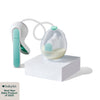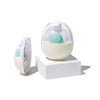There’s no way to sugarcoat it: A whopping 67 percent of American women, regardless of whether they’re a parent, have trouble sleeping1. If you’re one of the lucky women who has never experienced sleep issues before becoming a mom, when you have a baby, you might be surprised that lack of sleep can be an issue.
Not every new parent is going to experience major sleep issues, of course. But here is the truth: Parenthood brings sleep interruptions galore, especially in the first few months. One study shows that more than half of parents report losing two or more more hours of sleep for about the first 12 weeks2 of their baby’s life.
Sleep interruptions are common and natural - they are not an indicator you are doing anything wrong!
Common sleep interruptions in new parents are:
- Practical: Your baby has middle-of-the-night needs to address.
- Biological: Your regular circadian rhythms are disrupted due to inconsistent bedtimes and waking times4, which prevent you from getting deep sleep.
- Physical: Pain or discomfort stemming from pregnancy, labor, or postpartum conditions such as mastitis makes it hard to rest, let alone sleep.
- Routine-oriented: Without good sleep hygiene, you are having a hard time falling or staying asleep.
- Psychological: Parents with perinatal mood and anxiety disorders (PMADs) are significantly more likely to suffer from sleep deprivation5.
- Hormonal: A mother’s hormone levels significantly change during pregnancy and after delivery. Oxytocin alone can keep a mom on heightened alert.
Sometimes, of course, you’ll experience a combination of these sleep interruption factors, along with a running (and increasingly long) list of to-dos in your brain that makes it hard to snooze.
Try not to worry. Postpartum sleep struggles don’t necessarily signal a new and permanent state of affairs. This guide is designed to provide you with a better understanding of why you need sleep (and what qualifies as adequate sleep for parents of infants), what can keep you awake (beyond baby-related interruptions), how to better prepare for and optimize the sleep you do manage to get, and what to do when all your valiant efforts still result in #sleepfail.
Get pumping support with Simplifed
Get pumping support with Simplifed
Get access to free virtual feeding support from the lactation consultants at Simplifed. They can help you navigate supply issues, introduce a bottle, and more, and are trained on Willow pumps.























